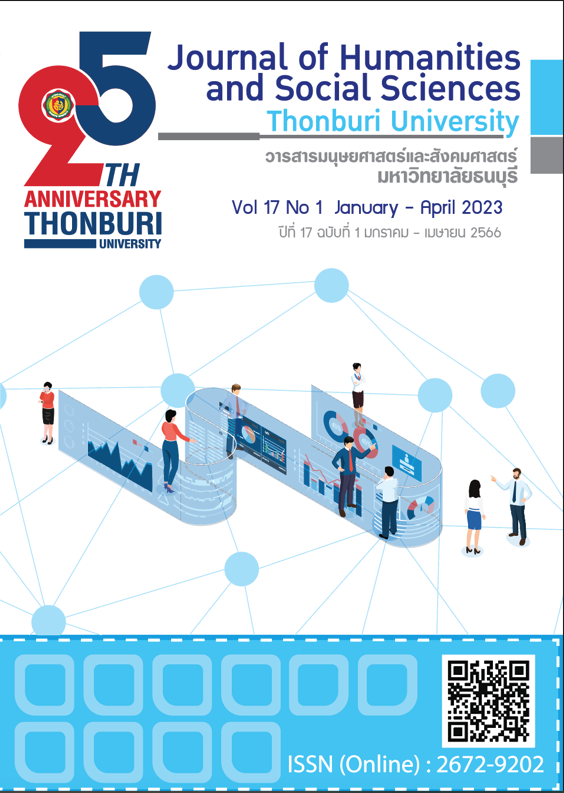อิทธิพลของปัจจัยการยอมรับเทคโนโลยีที่มีต่อความตั้งใจเรียนผ่านพฤติกรรมการเรียนรู้ออนไลน์ระหว่างคนของเจเนอเรชันวายและแซดในกรุงเทพมหานคร
Main Article Content
บทคัดย่อ
การวิจัยครั้งนี้มีวัตถุประสงค์เพื่อเปรียบเทียบอิทธิพลของปัจจัยการยอมรับเทคโนโลยีที่มีต่อความตั้งใจในพฤติกรรมการเรียนรู้ออนไลน์ระหว่างคนเจนเนอเรชันวายและแซดในกรุงเทพฯ ช่วงโควิด 19 โดยการศึกษานี้ ใช้ตัวอย่างจากนักเรียนเจนเนอเรชันวายและแซดจำนวน 275 ตัวอย่าง เครื่องมือวิจัยซึ่งมีข้อคำถามทั้งหมด 30 รายการและค่าสัมประสิทธิ์อัลฟาของครอนบาคที่ 0.9 ถูกใช้สำหรับการรวบรวมข้อมูล ความสัมพันธ์ระหว่างความคาดหวังต่อการปฏิบัติงาน ความคาดหวังด้านความพยายาม อิทธิพลทางสังคม และสภาพของสิ่งอำนวยความสะดวกที่ส่งผลต่อความตั้งใจในพฤติกรรมการเรียนรู้ออนไลน์ของนักเรียนในเขตกรุงเทพมหานคร การศึกษานี้ใช้การวิเคราะห์การถดถอยแบบลำดับชั้นเพื่อตรวจสอบผลการกำกับของเจนเนอเรชัน ผลการศึกษาพบว่า คนเจนเนอเรชันใหม่รับรู้ความคาดหวังต่อการปฏิบัติงานและความคาดหวังด้านความพยายามนั้นสูงกว่าคนเจนเนอเรชันเก่า ในการเพิ่มความตั้งใจในพฤติกรรมการเรียนรู้ออนไลน์ การจัดการศึกษาควรตรวจสอบให้แน่ใจว่าข้อความเกี่ยวกับผลการปฏิบัติงานของระบบการศึกษาออนไลน์และความเหมาะสมของระบบออนไลน์ได้รับการรับรู้เป็นอย่างดีจากกลุ่มเป้าหมายที่มีอายุน้อย ในขณะที่อิทธิพลทางสังคมและสภาพของสิ่งอำนวยความสะดวกควรมีมาตรฐานและได้รับการรับอย่างดีจากทั้งสองเจนเนอเรชัน
Article Details

This work is licensed under a Creative Commons Attribution-NonCommercial-NoDerivatives 4.0 International License.
ผลงานที่ปรากฎในวารสารฉบับนี้เป็นลิขสิทธิ์เฉพาะส่วนบุคคลของผู้เขียนซึ่งต้องรับผิดชอบต่อผลทาง กฎหมายที่อาจเกิดขึ้นได้และไม่มีผลต่อกองบรรณาธิการReferences
Abdullah, F., & Ward, R. (2016). Developing a General Extended Technology Acceptance Model for E-Learning (GETAMEL) by analysing commonly used external factors. Computers in human behavior, 56, 238-256.
Chaiyakulwat, N. (2017). Application of the combined theory of adoption and use of technology to understand the acceptance of the investment community as if booking for retail investors. Independent research. Master of Business Administration, Bangkok University.
Fernquest, J. (2016). Generation Y Thailand: A new Me Generation? Retrieved February 24, 2021, from Bangkok Post: https://www.bangkokpost.com/learning/advanced/1038478/generation-y-thailand-a-new-me-generation-.
Ferrari, P. (2018). Generation Z-ers are coming of age and bringing. Retrieved February 24, 2021, from https://www.capstan.be/generation-z-ers-are-coming-ofage-age-and-bringing-fresh-challenges-to-educators.
Hair, J. F., Black, W. C., Babin, B. J., & Anderson, R. E. (2018). Multivariate data analysis: a global perspective (7th ed.). New York: Pearson.
Joa, C. Y., & Magsamen-Conrad, K. (2021). Social influence and UTAUT in predicting digital immigrants’ technology use. Behaviour & Information Technology, 1-19.
Khechine, H., & Augier, M. (2019). Adoption of a social learning platform in higher education: an extended UTAUT model implementation. In Proceedings of the 52nd Hawaii International Conference on System Sciences. 53-62.
Khechine, H., & Lakhal, S. (2018). Technology as a Double-edged Sword: From Behavior Prediction with UTAUT to Students' Outcomes Considering Personal Characteristics. Journal of Information Technology Education, 17, 63-102.
Khechine, H., Lakhal, S., Pascot, D., & Bytha, A. (2014). UTAUT model for blended learning: The role of gender and age in the intention to use webinars. Interdisciplinary Journal of E-Learning and Learning Objects, 10(1), 33-52.
KTC Academy. (2018). Course on Knowing and Understanding Working Style with Gen Y and Gen Z (Understanding Gen Y and Gen Z Working Style). Retrieved February 24, 2021, from KCT Academy: https://kctathailand.com/courses/courses-know-understand style/.
Li, C., & Lalani, F. (2020). The COVID-19 pandemic has changed education forever: This is how. Retrieved February 23, 2021, from World Economic forum: https://www.weforum.org/agenda/2020/04/coronavirus-education-global-covid19-online-digital-learning/.
Lin, P. C., Lu, H. K., & Liu, S. C. (2013). Towards an Education Behavioral Intention Model for e-learning Systems: An Extension of UTAUT. Journal of Theoretical & Applied Information Technology, 47(3)., 47(3).
Mardikyan, S., Besiroglu, B., & Uzmaya, G. (2021). Behavioral intention towards the use of 3G technology. Communications of the IBIMA, 1.
National Statistical Office. (2019). Demographic statistics Population and housing. Retrieved February 26, 2021, from NESDB: http://statbbi.nso.go.th/staticreport/page/sector/th/01.aspx
Persada, S. F., Miraja, B. A., & Nadlifatin, R. (2019). Understanding the generation Z behavior on D-learning: A Unified Theory of Acceptance and Use of Technology (UTAUT) approach. International Journal of Emerging Technologies in Learning (iJET), 14(5), 20-33.
Phakdichakriwut, Y. (2020). Covid-19 accelerates 'education' in Thailand until it's time to change? Retrieved February 25, 2021, from Bangkok Business:: https://www.bangkokbiznews.com/news/detail/885550.
Postolov, K., Magdinceva Sopova, M., & Janeska Iliev, A. (2017). E-learning in the hands of generation Y and Z. Poslovna izvrsnost, 11(2), 107-119.
Purwanto, E., & Loisa, J. (2020). The intention and use behaviour of the mobile banking system in Indonesia: UTAUT Model. Technology Reports of Kansai University, 62(06), 2757-2767.
Setchinda, T., & Mimacha, K. (2019). Factors Influencing Consequences of Consequently Using Telephone Banking Services: Case studies of service users in Bangkok. RMUTT Global Business and Economics Review, 14(1), 117-138.
Tan, P. B. (2013). Applying the UTAUT to understand factors affecting the use of English e-learning websites in Taiwan. Sage Open, 3(4).
Techakritteerapong, W., & Inthuchhanyong, S. (2016). Factors for accepting the use of collaboration technology among personnel in organizations in Thailand. Journal of Business Administration, 39(152), 30-44.
Vanichanan, P. (2020). Basic education in the Covid-19 era: how to open and close schools? Retrieved February 23, 2021, from TDRI: https://tdri.or.th/2020/05/basic-education-in-covid-19-crisis-reopening-school-after-lockdown/.
Venkatesh, V., Morris, M. G., Davis, G. B., & David, F. D. (2003). User acceptance of information technology: Toward a unified view. MIS quarterly, 425-478.
Yousafzai, S. Y., Foxall, G. R., & Pallister, J. G. (2007). Technology acceptance: a meta‐analysis of the TAM: Part 1. Journal of Modelling in Management.

